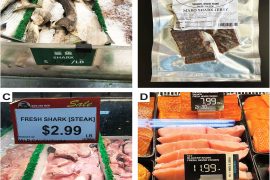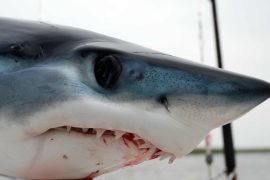
How endangered shark meat ends up on grocery shelves despite global bans
Sharks have survived for hundreds of millions of years. They outlived the dinosaurs, Ice Ages, and major climate shifts. Yet today, they are disappearing rapidly – not because of nature, but because of us.
Since the 1970s, their global numbers have fallen by more than 70 percent. The causes are not mysterious: overfishing, finning, bycatch, and growing demand for shark meat.
The International Union for Conservation of Nature (IUCN) now lists nearly 40 percent of shark species as threatened. Laws and trade bans set rules, but sellers still put sharks on the market.
Shark meat trade uncovered
A team at the University of North Carolina decided to check what is actually on sale in the United States.
They bought shark products from grocery stores, seafood markets, and online shops. Using DNA barcoding, they tested the species. The results were shocking.
“We found critically endangered sharks, including great hammerhead and scalloped hammerhead, being sold in grocery stores, seafood markets, and online,” said study co-author Dr. Savannah Ryburn.
“Of the 29 samples, 93 percent were ambiguously labeled as ‘shark,’ and one of the two products labeled at the species level was mislabeled,”
Misleading labels everywhere
Most of the products carried only the word “shark.” Sellers even mislabeled some as safer species. Out of 30 samples, just one had a correct and clear label.
The rest included a mix of 11 species, three of which were critically endangered. Nearly a third came from species already at serious risk of extinction.
This problem isn’t limited to the United States. Around the world, shark meat appears under names like “cazón” in Brazil, “flake” in Australia, and “rock salmon” in the UK. In Peru, most people eating “tollo” did not even know it was shark.
These vague labels hide what consumers are really buying and make it almost impossible to track trade in threatened species.
Sellers put endangered sharks in plain sight, deny scientists the ability to track catches, and prevent buyers from making safe, informed choices.
Meat sold at low prices
Researchers also pointed to the price. Endangered sharks were selling for less than $5 a pound in U.S. grocery stores.
By comparison, red snapper sold for $27 a pound. The numbers show how little the market values these predators, even though they play a critical role in ocean ecosystems.
“The legality of selling shark meat in the United States depends largely on where the shark was harvested and which species are involved, under regulations from CITES and the Endangered Species Act,” Ryburn explained.
“However, by the time large shark species reach grocery stores and markets, they are often sold as fillets with all distinguishing features removed, making it unlikely that sellers know what species they are offering.”
![Photos exemplifying how some of the samples were labeled and displayed when purchased. (A) Dusky smooth-hound sold whole, missing the head, labeled as “shark” in English and Chinese at an Asian grocery store in Orlando, FL. (B) Shortfin mako shark sold as jerky and purchased online from the Newport Jerky Company in Rhode Island labeled as “mako shark jerky”. (C) Common thresher shark sold as “fresh shark [steak]” at an Asian grocery store in Duluth, GA. The label also included “wild caught/USA”. (D) Blacktip shark labeled as “wild blacktip shark, fresh never frozen” from a Publix grocery store in Cary, NC. The label also included that it was a “product of Florida” and that it was “responsibly sourced”. Credit: Frontiers in Marine Science](https://cff2.earth.com/uploads/2025/09/14145548/endangered-shark-meat_false-labels_Frontiers_1s.webp)
Eating shark meat is dangerous
This issue isn’t only about conservation. Sharks such as hammerheads and makos carry high levels of mercury and arsenic in their tissues. These metals damage the nervous system, harm unborn children, and increase cancer risks.
Mislabeled products strip consumers of their ability to make safe choices and put families at risk without their knowledge.
The danger grows because heavy metals accumulate over time, meaning even small, repeated servings of shark meat can cause long-term health effects that no label warns about.
Clear labels protect sharks
The United States still allows “shark” as a generic market name. In contrast, the European Union requires far more detail, including the scientific name and catch area.
Without clear labeling, the public cannot know whether their dinner is harmless dogfish or a critically endangered hammerhead.
“Sellers in the United States should be required to provide species-specific names,” Ryburn said. “And when shark meat is not a food security necessity, consumers should avoid purchasing products that lack species-level labeling or traceable sourcing.”
Shark extinction risks ocean collapse
Sharks have been around for half a billion years. If we continue to treat them as cheap, nameless meat, we may be the generation that sees them vanish. Their loss would not be just another statistic on the list of endangered species.
It would mean oceans without their top predators, seas where fish populations explode or collapse without balance, and ecosystems that unravel in ways we cannot easily repair. Communities that depend on healthy oceans for food and livelihoods would also suffer.
Sharks have shaped marine life for millions of years, and their future now depends on the choices we make today.
The study is published in the journal Frontiers in Marine Science.
—–
Like what you read? Subscribe to our newsletter for engaging articles, exclusive content, and the latest updates.
Check us out on EarthSnap, a free app brought to you by Eric Ralls and Earth.com.
—–
News coming your way













